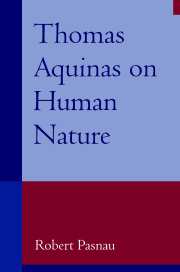Book contents
- Frontmatter
- Contents
- List of Abbreviations
- Acknowledgments
- A Note to the Reader
- Introduction
- PART I ESSENTIAL FEATURES (QQ75–76)
- PART II CAPACITIES (QQ77–83)
- PART III FUNCTIONS (QQ84–89)
- 9 Mind and image
- 10 Mind and reality
- 11 Knowing the mind
- 12 Life after death
- Epilogue: Why Did God Make Me?
- Notes
- Bibliography
- Appendix: Outline of the Treatise (ST 1a 75–89)
- Index
9 - Mind and image
Published online by Cambridge University Press: 05 June 2012
- Frontmatter
- Contents
- List of Abbreviations
- Acknowledgments
- A Note to the Reader
- Introduction
- PART I ESSENTIAL FEATURES (QQ75–76)
- PART II CAPACITIES (QQ77–83)
- PART III FUNCTIONS (QQ84–89)
- 9 Mind and image
- 10 Mind and reality
- 11 Knowing the mind
- 12 Life after death
- Epilogue: Why Did God Make Me?
- Notes
- Bibliography
- Appendix: Outline of the Treatise (ST 1a 75–89)
- Index
Summary
Non enim proprie loquendo sensus aut intellectus cognoscunt sed homo per utrumque.
(QDV 2.6 ad 3)Beginning with Q84, the Treatise takes up the operations of the soul's various capacities. Aquinas officially confines his attention to intellectual operations (see §In.4), but the workings of intellect are not themselves intelligible apart from the workings of sense. Even in nonrational animals, there is something that comes close to the power of reason, the estimative power (§9.1). The human sensory system has something even more sophisticated, a cogitative power, which along with intellect plays a crucial role in human perception (§9.2). These perceptual processes furnish the information (phantasms) which the intellect runs on (§9.3). And even once the intellect receives this information, the sensory powers continue to play a role, because the intellect must constantly turn itself back toward phantasms, relying on the senses to furnish the images that human thinking constantly requires (§9.4).
Forms and intentions
Aquinas draws a sharp distinction between the sensory and the rational. The one is material, the other immaterial; the one apprehends particular features of the world, the other apprehends the world as universal. One might suppose, accordingly, that the operations of sense and intellect would be likewise segregated. In fact the opposite is true. The cognitive processes of a human being are in large part a cooperative venture between sense and intellect. To understand the operations of intellect, one must first understand the higher sensory operations.
- Type
- Chapter
- Information
- Thomas Aquinas on Human NatureA Philosophical Study of Summa Theologiae, 1a 75-89, pp. 267 - 295Publisher: Cambridge University PressPrint publication year: 2001



